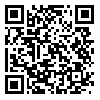

BibTeX | RIS | EndNote | Medlars | ProCite | Reference Manager | RefWorks
Send citation to:
URL: http://jdisabilstud.org/article-1-2300-en.html
2- MSc in Yazd Thermal-Solar Power Plant, Yazd Power Generation Management Company, Yazd, Iran
Abstract
Background & Objectives: One of the most important prerequisites of community growth is providing physical and mental health to individuals in the community. From the perspective of the World Health Organization, health is not just the absence of disease; instead, health is having physical, mental, and social balance. The human environment includes physical, social, and psychological factors affecting human health. Workplace stresses can have detrimental effects on employees, causing burnout and affecting all aspects of a person's life. One of the consequences of these factors is the phenomenon of job burnout. Job burnout is physical, emotional, and mental fatigue after being in a difficult position for a long time. This syndrome is a state in which people's strength and ability are low, and their desire to do work and activities is reduced. One of the influential factors in employees' job burnout is their personality. Personality is the exclusive characteristics of people that separate them from others and predict human behavior in specific situations. Neglecting the selection of employees based on personality traits can lead to unfortunate consequences such as lack of motivation, job stress, job burnout, etc. Therefore, the current research was conducted to predict job burnout based on personality type (introversion and extroversion) among the electrical industry employees in Yazd City, Iran.
Methods: The research method was descriptive–correlational. The study's statistical population included all employees of the electricity industry in Yazd City, Iran, in 2019. A total of 160 employees were selected using the convenience sampling method. The inclusion criterion was their willingness to participate in the research. The ethical considerations observed in this study were as follows: all participants' information was collected in accordance with ethical principles, including the fact that the questionnaires were anonymous and coded, and confidentiality was observed. Participants also cooperated in this study with their consent. For data collection, the Job Burnout Inventory (Maslach & Jackson, 1986) and dimensions of introversion and extroversion of the Eysenck Personality Type Questionnaire (Eysenck & Eysenck, 1975). The descriptive statistics section used the mean, standard deviation, minimum, and maximum for data analysis. The inferential statistics section used the Pearson correlation coefficient and regression analysis at a significance level 0.01 in SPSS software.
Results: The results showed no significant relationship between extroverted personality type and job burnout in both men and women (p>0.01). However, a positive, direct, and significant relationship was seen between introverted personality type and total job burnout (p<0.001, r=0.268) and in men (p=0.004, r=0.510). Also, no significant relationship was observed between introverted personality type and job burnout in women (p>0.01). Also, in fitting the regression model in the whole sample, it was observed that the introverted personality type significantly predicted job burnout (p<0.001, β=0.268), and this variable explained 7.2% of the changes in job burnout. In fitting the regression model in men, it was observed that the introverted personality type significantly predicted job burnout (p=0.004, β=0.510), and this variable explained 23% of the changes in job burnout.
Conclusion: According to the research findings, the introverted personality type can be considered one of the predictors of job burnout among employees of the electrical industry in Yazd.
| Rights and permissions | |
 |
This work is licensed under a Creative Commons Attribution-NonCommercial 4.0 International License. |


